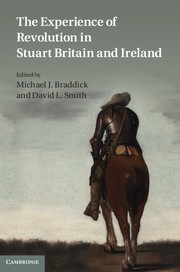Book contents
- Frontmatter
- Contents
- Notes on contributors
- Preface
- List of abbreviations
- JSM
- Introduction: John Morrill and the experience of revolution
- 1 The Scottish–English–Romish Book: the character of the Scottish Prayer Book of 1637
- 2 Popery in perfection? The experience of Catholicism: Henrietta Maria between private practice and public discourse
- 3 Sir Benjamin Rudyerd and England's ‘wars of religion’
- 4 Rhetoric and reality: images of Parliament as Great Council
- 5 Cathedrals and the British Revolution
- 6 History, liberty, reformation and the cause: Parliamentarian military and ideological escalation in 1643
- 7 Sacrilege and compromise: court divines and the king's conscience, 1642–1649
- 8 Law, liberty, and the English Civil War: John Lilburne's prison experience, the Levellers and freedom
- 9 On shaky ground: Quakers, Puritans, possession and high spirits
- 10 James Harrington's prescription for healing and settling
- 11 ‘The Great Trappaner of England’: Thomas Violet, Jews and crypto-Jews during the English Revolution and at the Restoration
- 12 The Cromwellian legacy of William Penn
- 13 Irish bishops, their biographers and the experience of revolution, 1656–1686
- 14 Religion and civil society: the place of the English Revolution in the development of political thought
- Bibliography of the major writings of John Morrill, 1967–2009
- Index
6 - History, liberty, reformation and the cause: Parliamentarian military and ideological escalation in 1643
Published online by Cambridge University Press: 05 August 2011
- Frontmatter
- Contents
- Notes on contributors
- Preface
- List of abbreviations
- JSM
- Introduction: John Morrill and the experience of revolution
- 1 The Scottish–English–Romish Book: the character of the Scottish Prayer Book of 1637
- 2 Popery in perfection? The experience of Catholicism: Henrietta Maria between private practice and public discourse
- 3 Sir Benjamin Rudyerd and England's ‘wars of religion’
- 4 Rhetoric and reality: images of Parliament as Great Council
- 5 Cathedrals and the British Revolution
- 6 History, liberty, reformation and the cause: Parliamentarian military and ideological escalation in 1643
- 7 Sacrilege and compromise: court divines and the king's conscience, 1642–1649
- 8 Law, liberty, and the English Civil War: John Lilburne's prison experience, the Levellers and freedom
- 9 On shaky ground: Quakers, Puritans, possession and high spirits
- 10 James Harrington's prescription for healing and settling
- 11 ‘The Great Trappaner of England’: Thomas Violet, Jews and crypto-Jews during the English Revolution and at the Restoration
- 12 The Cromwellian legacy of William Penn
- 13 Irish bishops, their biographers and the experience of revolution, 1656–1686
- 14 Religion and civil society: the place of the English Revolution in the development of political thought
- Bibliography of the major writings of John Morrill, 1967–2009
- Index
Summary
As civil war broke out in 1642, both sides claimed to be acting defensively: the war was defined in terms of what it was intended to prevent, rather than what it was hoped it would achieve. Partisans sought military strength in order to secure a safe peace, with the result that there was a contrapuntal relationship between fighting and talking. But there was an inherent difficulty in this: the increasing demands of the military mobilizations put pressure on the initially defensive claims. In summer 1642 there had been tussles for control over local military resources and in the autumn one significant pitched battle, which proved inconclusive. Early in 1643, these military considerations looked rather different and rather more challenging. As peace negotiations were about to start in Oxford, Parliament was also preparing for a sustained campaign on several fronts. Innovative financial and military demands forced Parliament to claim powers that were difficult to justify in legal and constitutional terms acceptable before the war. This pressure for administrative innovation, built into the effort to secure a peace by fighting a war, generated new claims to political legitimacy – either in the sense of novel uses of pre-existing forms of argument, or entirely new political and religious claims. As the practical costs of military mobilization escalated, in other words, so, too, did the ideological claims of the cause, with the consequence that the campaign might come to seem quite different from the one being championed in January or even September 1642.
- Type
- Chapter
- Information
- The Experience of Revolution in Stuart Britain and Ireland , pp. 117 - 134Publisher: Cambridge University PressPrint publication year: 2011
- 5
- Cited by



